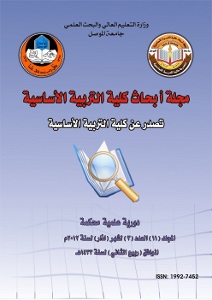The Impact of Using Small Games on Developing Creative Thinking for Preschool Children
Abstract
. (40) (20) (20) (20) (10) (10) . . ( ) (30) : ( () _ ). :1. .2. . :1. .2. .3. The study aims revealing the impact of using small games on developing creative thinking for preschool children. The two researchers used experimental approach for it is suitable for the study. The study sample consisted of (40) children, (20) are boys and (20) are girls. They were distributed into two groups, (20) children for each group, (10) boys and (10) girls. Equivalence was made in accordance with these variables: child rank among his/her brothers, age, educational background of the parents, intelligence and creative thinking measures. The experimental group implemented the small games program while the control group did not implement any. The program implementation lasted for six weeks with five (30) minutes teaching units for each week. The following statistical means were used: mean, standard deviation, simple correlation, T test for two correlated and equal means, and SpearmanBrown coefficient. The two researcher concluded the following: 1. Small games program developed creative thinking when comparing the pre and post measures for experimental group children. 2. Small games program was better in developing creative thinking for experimental group children in comparison with the control group. The two researches recommended the following: 1. Using small games in kindergarten for their positive and active role in developing creative thinking. 2. Various use of small games while using the available tools to implement such games in a way to attract the children attention and urge them to think positively. 3. Performing a similar study on a larger sample including many of the kindergartens to develop creative thinking.
